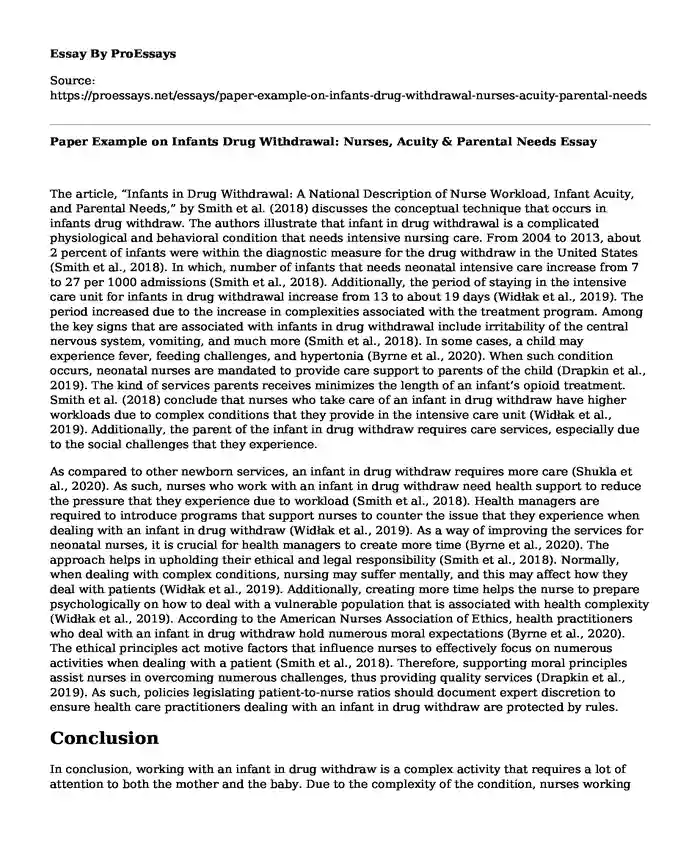The article, “Infants in Drug Withdrawal: A National Description of Nurse Workload, Infant Acuity, and Parental Needs,” by Smith et al. (2018) discusses the conceptual technique that occurs in infants drug withdraw. The authors illustrate that infant in drug withdrawal is a complicated physiological and behavioral condition that needs intensive nursing care. From 2004 to 2013, about 2 percent of infants were within the diagnostic measure for the drug withdraw in the United States (Smith et al., 2018). In which, number of infants that needs neonatal intensive care increase from 7 to 27 per 1000 admissions (Smith et al., 2018). Additionally, the period of staying in the intensive care unit for infants in drug withdrawal increase from 13 to about 19 days (Widlak et al., 2019). The period increased due to the increase in complexities associated with the treatment program. Among the key signs that are associated with infants in drug withdrawal include irritability of the central nervous system, vomiting, and much more (Smith et al., 2018). In some cases, a child may experience fever, feeding challenges, and hypertonia (Byrne et al., 2020). When such condition occurs, neonatal nurses are mandated to provide care support to parents of the child (Drapkin et al., 2019). The kind of services parents receives minimizes the length of an infant’s opioid treatment. Smith et al. (2018) conclude that nurses who take care of an infant in drug withdraw have higher workloads due to complex conditions that they provide in the intensive care unit (Widlak et al., 2019). Additionally, the parent of the infant in drug withdraw requires care services, especially due to the social challenges that they experience.
As compared to other newborn services, an infant in drug withdraw requires more care (Shukla et al., 2020). As such, nurses who work with an infant in drug withdraw need health support to reduce the pressure that they experience due to workload (Smith et al., 2018). Health managers are required to introduce programs that support nurses to counter the issue that they experience when dealing with an infant in drug withdraw (Widlak et al., 2019). As a way of improving the services for neonatal nurses, it is crucial for health managers to create more time (Byrne et al., 2020). The approach helps in upholding their ethical and legal responsibility (Smith et al., 2018). Normally, when dealing with complex conditions, nursing may suffer mentally, and this may affect how they deal with patients (Widlak et al., 2019). Additionally, creating more time helps the nurse to prepare psychologically on how to deal with a vulnerable population that is associated with health complexity (Widlak et al., 2019). According to the American Nurses Association of Ethics, health practitioners who deal with an infant in drug withdraw hold numerous moral expectations (Byrne et al., 2020). The ethical principles act motive factors that influence nurses to effectively focus on numerous activities when dealing with a patient (Smith et al., 2018). Therefore, supporting moral principles assist nurses in overcoming numerous challenges, thus providing quality services (Drapkin et al., 2019). As such, policies legislating patient-to-nurse ratios should document expert discretion to ensure health care practitioners dealing with an infant in drug withdraw are protected by rules.
Conclusion
In conclusion, working with an infant in drug withdraw is a complex activity that requires a lot of attention to both the mother and the baby. Due to the complexity of the condition, nurses working with an infant in drug withdraw experience a lot of ethical challenges. As a way of controlling the condition, health managers are supposed to create a condition that gives neonatal nurses time, thus promoting ethical principles. The approach motivates nurses to effectively engage in the care services, thus promoting a positive outcome.
References
Byrne, P. J., Foss, K., Clarke, D., Wismark, J., & Cardinal, K. (2020). Re; Newborns exposed to opioids need mothers more than NICU. CMAJ Group. https://www.cmaj.ca/content/re-newborns-exposed-opioids-need-mothers-more-nicu
Drapkin, Z., Franchek-Roa, K., Srinivas, G. L., Buchi, K. F., & Miescier, M. J. (2019). Is my baby normal? A review of seemingly worrisome but normal newborn signs, symptoms and behaviors. The American Journal of Emergency Medicine, 37(6), 1153-1159. https://static1.squarespace.com/static/54694fa6e4b0eaec4530f99d/t/5dd82bb035e8b009c3821581/1574448049479/Is+my+baby+normal%3F+A+review+of+seemingly+worrisome+but+normal+newborn+signs%2C+symptoms+and+behaviors.pdf
Shukla, S., Zirkin, L. B., & Gomez Pomar, E. (2020). Perinatal drug abuse and neonatal drug withdrawal. Pediatrics. https://uknowledge.uky.edu/cgi/viewcontent.cgi?article=1304&context=pediatrics_facpub
Smith, J. G., Rogowski, J. A., Schoenauer, K. M., & Lake, E. T. (2018). Infants in drug withdrawal: A national description of nurse workload, infant acuity, and parental needs. J Perinat Neinatal Nurs. https://pubmed.ncbi.nlm.nih.gov/29373422/
Widlak, K., Wójtowicz, A., Scislak, R., Drankowska, J., Kos, M., Szuster, A., . & Furmaga-Jablonska, W. (2019). Ischemic stroke as a rare cause of seizures in a newborn–case report. Journal of Education, Health and Sport, 9(7), 76-84. file:///E:/7100-26553-2-PB.pdf
Cite this page
Paper Example on Infants Drug Withdrawal: Nurses, Acuity & Parental Needs. (2023, Sep 25). Retrieved from https://proessays.net/essays/paper-example-on-infants-drug-withdrawal-nurses-acuity-parental-needs
If you are the original author of this essay and no longer wish to have it published on the ProEssays website, please click below to request its removal:
- The Fashion Police: Gender and the Rules of Beauty
- Essay on Screen Time and Content on Toddlers
- Essay Sample on Quitting Smoking: Admitting the Addiction and Crafting a Plan
- John's Character Development: From Trust to Mistrust at Age Two - Essay Sample
- Paper Example on Organization's Performance Metrics
- The Impact and Influence of Andrew Carnegie on the American Culture and Society - Essay Example
- US 2020 Elections - Essay Example







